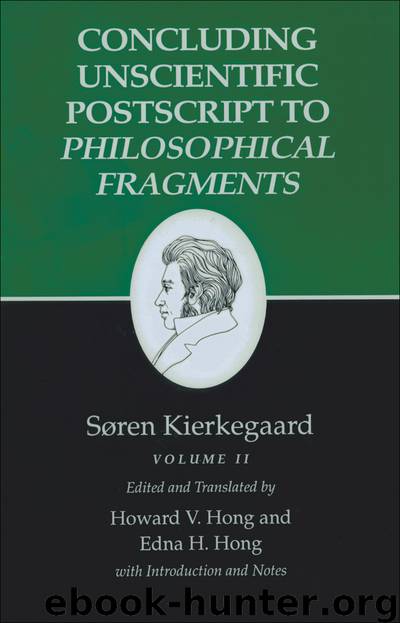Concluding Unscientific Postscript to Philosophical Fragments by Søren Kierkegaard

Author:Søren Kierkegaard
Language: eng
Format: epub
Publisher: Princeton University Press
Published: 1992-03-28T16:00:00+00:00
A. CONTINGENCY, OR FORMAL ACTUALITY, POSSIBILITY, AND NECESSITY
1. Actuality is formal in so far as, being primary actuality, it is only immediate, unreflected actuality, and hence is only in this form-determination but not as the totality of form. As such it is nothing more than a being or Existence in general. But because it is essentially not a mere immediate Existence but exists as form-unity of being-within-self or inwardness and outwardness, it immediately contains the in-itself or possibility. What is actual is possible.
3. This actuality is not the primary but the reflected actuality, posited as unity of itself and possibility. The actual as such is possible; it is in immediate positive identity with possibility; but this has determined itself as only possibility; thus the actual too, is determined as only a possible. And immediately because possibility is immediately contained in actuality, it is contained in actuality as sublated, as only possibility. Conversely, actuality which is in unity with possibility is only sublated immediacy; or because formal actuality is only immediate, primary actuality, it is only a moment, only sublated actuality, or only possibility.
529. Cf. Anxiety, p. 111, KW VIII (SV IV 379).
530. See, for example, Fragments, pp. 79-86, KW VII (SV IV 242-49).
531. See JP I 1033 (Pap V A 30).
532. With reference to the following paragraph, see Supplement, p. 2.73 (Pap. VI B 54:10).
533. See Supplement, p. 2.74 (Pap. VI B 98:59).
534. See Supplement, p. 2.74 (Pap. VI B 54:12).
535. See Aristotle, Poetics, 1451 a-b; Bekker, II, p. 1451; Works, II, pp. 2322-23:
From what we have said it will be seen that the poet’s function is to describe, not the thing that has happened, but a kind of thing that might happen, i.e. what is possible as being probable or necessary. The distinction between historian and poet is not in the one writing prose and the other verse—you might put the work of Herodotus into verse, and it would still be a species of history; it consists really in this, that the one describes the thing that has been, and the other a kind of thing that might be. Hence poetry is something more philosophic and of graver import than history, since its statements are of the nature rather of universals, whereas those of history are singulars.
536. See Supplement, p. 2.74 (Pap. VI B 54:13).
537. See Matthew 10:30.
538. With reference to the following sentence, see Supplement, pp. 2.74-75 (Pap. VI B 54:14).
539. See note 360 above; Stages, p. 439, KW XI (SV VI 409).
540. Matthew 7:1.
541. See note 360 above; Stages, p. 440, KW XI (SV VI 410).
542. See JP II 1745 (Pap. VI A 38).
543. See note 360 above; Stages, pp. 438-39, KW XI (SV VI 408-09).
544. See Diogenes Laertius, II, 20-21; Vitis, I, pp. 70-71; Riisbrigh, I, p. 66; Loeb, I, pp. 150-51:
Demetrius of Byzantium relates that Crito removed him from his workshop and educated him, being struck by his beauty of soul; that he discussed moral questions in the workshops and the market-place, being convinced that the study of nature is no concern of ours; and that he claimed that his inquiries embraced.
Download
This site does not store any files on its server. We only index and link to content provided by other sites. Please contact the content providers to delete copyright contents if any and email us, we'll remove relevant links or contents immediately.
The remains of the day by Kazuo Ishiguro(9000)
Tools of Titans by Timothy Ferriss(8396)
Giovanni's Room by James Baldwin(7346)
The Black Swan by Nassim Nicholas Taleb(7129)
Inner Engineering: A Yogi's Guide to Joy by Sadhguru(6796)
The Way of Zen by Alan W. Watts(6614)
The Power of Now: A Guide to Spiritual Enlightenment by Eckhart Tolle(5782)
Asking the Right Questions: A Guide to Critical Thinking by M. Neil Browne & Stuart M. Keeley(5775)
The Six Wives Of Henry VIII (WOMEN IN HISTORY) by Fraser Antonia(5515)
Astrophysics for People in a Hurry by Neil DeGrasse Tyson(5190)
Housekeeping by Marilynne Robinson(4448)
12 Rules for Life by Jordan B. Peterson(4305)
Ikigai by Héctor García & Francesc Miralles(4274)
Double Down (Diary of a Wimpy Kid Book 11) by Jeff Kinney(4272)
The Ethical Slut by Janet W. Hardy(4253)
Skin in the Game by Nassim Nicholas Taleb(4250)
The Art of Happiness by The Dalai Lama(4130)
Skin in the Game: Hidden Asymmetries in Daily Life by Nassim Nicholas Taleb(4007)
Walking by Henry David Thoreau(3962)
